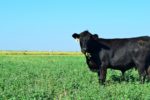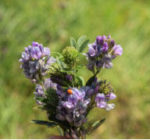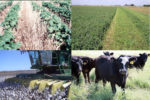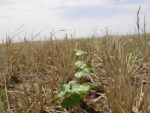Showing 1-6 of 6 results

The Performance of Cover Crops in Minimally Tilled Forage-based Grazing Systems
In a Southern SARE-funded Graduate Student Grant (GS15-152), “Evaluation of Winter Annual Cover Crops Under Multiple Residue Management: Impacts on land management, soil water depletion, and cash crop productivity,” Texas Tech University researchers investigated five cover crops species as potential complements to a warm-season beef-stocker grazing system. The impact of the project was two-fold: Stabilize the soil surface from excessive wind erosion and desiccation; and strengthen rural communities by ensuring the persistence of profitable agriculture in the region.

Integrating Legumes with Grass to Improve Forage-Livestock Systems
In a Southern SARE-funded Research and Education Grant (LS14-261), "Long-term Agroecosystems Research and Adoption in the Texas Southern High Plains -- Phase III," Texas Tech University researchers conducted a steer grazing trial comparing a grass only system to a grass-legume system for animal productivity and water use efficiency.
Sustainable High Plains Research Bulletins
A series of bulletins showcasing the various facets of Texas Tech University research on integrated crop and livestock production systems in the Texas High Plains. The bulletins cover sustainable agroecosystems, crops and soils, and water conservation.

Agroecosystems Economics in the Texas High Plains: A 10-year analysis, 1999-2008
Based on 10 years of Texas Tech University research, integrated cotton-forage-beef cattle systems are just as profitable as cotton monoculture systems. But there’s more. Integrated crop-livestock systems use less irrigation water, are more energy efficient, preserve soils by reducing wind erosion, and have a lower economic risk related to specific-loss events, such as a drought.

Soil Quality of Integrated Crop/Livestock Systems: Enhancing soil carbon sequestration and microbial diversity
In the Southern SARE-funded study (LS10-229), “Integrated Crop and Livestock Systems for Enhanced Soil Carbon Sequestration and Microbial Diversity in the Semi-arid Texas High Plains,” Texas Tech University researchers evaluated integrated crop/livestock systems for long-term soil quality by assessing microbial activity and soil carbon storage.

Cover Crops and Cotton in the Texas High Plains: SARE research summary, 2007-2009
In a Southern SARE-funded Graduate Student Grant (GS07-056), “Allelopathic Effects of Small Grain Cover Crops on Cotton Plant Growth and Yields,” Texas Tech University researchers investigated allelopathy as the possible cause of the observed suppression and to incorporate livestock grazing as a means of reducing the allelopathic effects on the cotton crop.